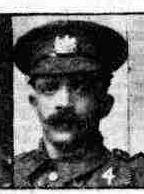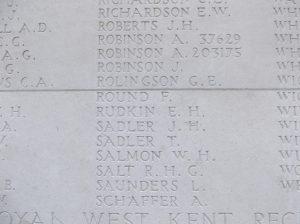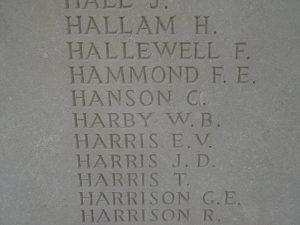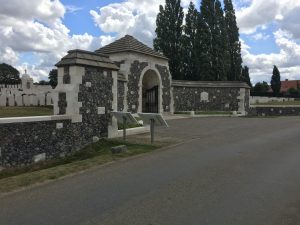On this day, 2nd December 2017, we remember three of our local men that lost their lives in the Great War exactly 100 years ago..
Private Ernest Henry Rudkin
Kirkby Underwood – 2nd Battalion Royal Berkshire Regiment
Lieutenant Rupert Hardy Parker
Morton – 2nd Battalion Lincolnshire Regiment
Private Walter Blankley Harby (Scarborough)
Rippingale – 2nd Battalion Lincolnshire Regiment
The Battle of Passchendaele was, by this time in 1917, officially over. The original gains during this battle were largely lost and the lines had stagnated. Major actions were officially finished for the winter but the enemy held a superior position on the Passchendaele ridge. This position was at the junction of the 8th and 32nd Brigades and allowed the enemy to place enfilade fire into the British defensive line. The men 8th and 32nd divisions, which included our three local men in the 24th Infantry Brigade, had been previously been given orders and had been training for the planned action that was to take place on the night of the 1st / 2nd December. The plan was to attack in full moonlight, without a creeping barrage, surprise the enemy and push them back from their superior position, thus ensuring that our Divisions could hold a slightly better defensive line in preparations for new actions in the spring of 1918.
Much conjecture and debate has been given to this almost forgotten action, which it could be argued was of very little tactical merit and is now known as “The Moonlight Massacre”.
The story of that night viewed from the perspective of the 2nd Lincolnshire. The 2nd Battalion, had seen action as part of the Battle of Passchendaele and on the 16th August 1917 they were removed from the front line following heavy losses at the Battle of Langemarck where only three hundred men remained fit for active service. September, October and half of November saw the battalion in trenches around Basseville and Warenton or in support or divisional reserve in the region. Officially the battle of Passchendaele ended in November 1917 with the front returning back to its previous routine of trench life, patrols, shelling and sniping. Although one final mass action had already been planned and was still carried out.
On the 1st December C Company 2nd battalion Lincolnshire Regiment paraded at 3:15pm and set out for the trenches near Passchendaele. The only way to the front line was by a duck board track across deep clinging mud. The enemy guns had found their mark on the track and only about 20 men reached the front line to take up the two posts on the left battalion front. An hour later the remaining three companies, detailed as assault troops started moving up. It shows the terrible nature of moving up in the fact that it took the first company 5 hours to reach the front of the duck board track. The first company was in position by 10pm and the last company by 12:20am.
The three companies started to attack at 1:55am (2nd December 1917) and immediately were spotted by the enemy who set up heavy machine gun fire. Before their own outpost line was reached every officer of the three companies became a casualty. The advance stopped about 30 yards from the enemy’s front trench and the battalion dug in. They were relieved from this position by the 8th Rifle Brigade and moved back to Camp St. Jean.
In this attack casualties were heavy. Captain A Cowe (Medical officer), Lieutenant Rupert H Parker and 16 other ranks killed. 2nd lieutenants Griffin (Later died of wounds), Eliot, Sowerby, Joyce, Green, Graves, Grant and Perkins along with 64 other ranks wounded. 25 other ranks were missing.
Lieutenant Rupert Hardy Parker was killed whilst leading his company in this ill fated action on the 2nd December 1917, where the men were asked to attack on a moonlight night, in snow and towards an heavily defended position.
Lieutenant Rupert Hardy Parker
Rupert was the only son of Charles John Ernest Parker a Gentleman of Beaconfield House, Harrowby, Grantham and his wife Louisa Dempsey. Rupert’s father was a former Captain in the 3rd battalion Lincolnshire regiment, His Grandfather was a former Lt Col of the South Lincs Militia, His Gt Grandfather Lt-Col, deputy Lord Lieutenant and High Sheriff of Lincolnshire.
By the time of the war the family home was Ludshott House, Grayshott, Hampshire.
Rupert was educated at Wellington College, Crowthorne, Berkshire and an undergraduate of Christ Church College, Oxford and was due to start before joining the army at the outbreak of war.
Rupert was accepted on probation as a second lieutenant in the 3rd Battalion Lincolnshire regiment on 21st October 1914. After training he was transferred to the 2nd Battalion Lincolnshire regiment arriving in France on the 20th February 1915.
Rupert finally completing his probation in March 1915 and was confirmed as a second lieutenant.
During 1915 Rupert was twice wounded at Neuve Chapelle and Fromelles.
Rupert obtained a regular commission in June 1916 before his Battalion were to form part of the history of the Third Battle of Ypres, commonly known as the Battle of Passchendaele.
Lieutenant Rupert Hardy Parker, 2nd Battalion, The Lincolnshire Regiment, is remembered with honour on the Tyne Cot Memorial to the missing which is located 9 km north east of Ieper (Ypres), Belgium.
Panel Ref: 35 to 37 and 162 to 162A
Rupert is also commemorated on the Morton memorial and also on a family memorial plaque in St Wulfram’s Church, Grantham.
Private Ernest Henry Rudkin
Ernest Rudkin was born in 1891 in Morton near Bourne, Lincolnshire to Henry James Rudkin, a waggoner and his wife Mary Ann Wrighton. Ernest was the eldest of their 7 children, Bertie, Arthur, Edith, Florence, Albert and Cedric all being born as the family moved around the area as Henry found work as a Horseman and Waggoner on farms in Morton, Witham on the Hill, Corby Glen, Swinsted and eventually the family settled at Kirkby Underwood.
By 1911 Ernest was now working as a waggoner on a farm in Burton Coggles and was living with the Mason family. In 1914 Ernest married Sophia Osbourne and their son Jarvis was born in the spring of 1915.
Ernest along with his younger brother Bertie both undertook their duty to their country and sadly the family learned of the death of Bertie in September 1916. He had been serving with the 1st battalion Lincolnshire Regiment.
Ernest was now serving with the 2nd Battalion Royal Berkshire Regiment and in the early hours of 2nd December, 2 Km to the North of Passchendaele in Belgium, Private 37869 Ernest Henry Rudkin of 2nd Battalion Royal Berkshire Regiment was amongst the 35 Other Ranks killed in action.
The letter to his parents received in January 1918 from 2nd Lieut Durnford said he had died instantly as a result of Shell fire and buried soon after.The location was not recorded.He further stated that he had died in action gallantly doing his duty.A classic style of letter sent to many families at that time.Ernest was the eldest son of the family living in Kirkby Underwood at that time but they had already lost their 2nd Son Bertie some 15 months earlier.Ernest Henry also left a wife and a 3 year old infant boy. Ernest has no known grave but is remembered on the Tyne Cott Memorial, in Kirkby Underwood Church and on the family grave in Little Bytham Churchyard.

He is also remembered today by his family members who are determined to never forget what our Service Ancestors were asked to do so many years ago and how well they did it. Thanks to Peter Reichelt for information about Ernest.
Private Walter Blankley Harby AKA Walter Scarborough
Walter Harby was born in 1897 in Wandsworth London to Charlotte Elizabeth Harby of Pickworth Lincolnshire. Charlotte later married Thomas Scarborough, a shepherd from Brauncewell near Sleaford in 1899 and moved to Dowsby. The family left Dowsby after the birth of son Harold and moved to Aslackby where son Joseph was born, the family eventually moving to Rippingale.
In December 1915 Walter attested to the Army Reserve and was later mobilised into 3rd battalion Lincolnshire Regiment in July 1916. After training he was posted to the 2nd Battalion prior to them embarking for France on the 18th November 1916.
Walter was killed in action and buried in the field on 2nd December 1917. We can only assume that the burial place was later destroyed by later fighting as Walter is now commemorated on the Tyne Cot memorial to the missing.





Recent Comments